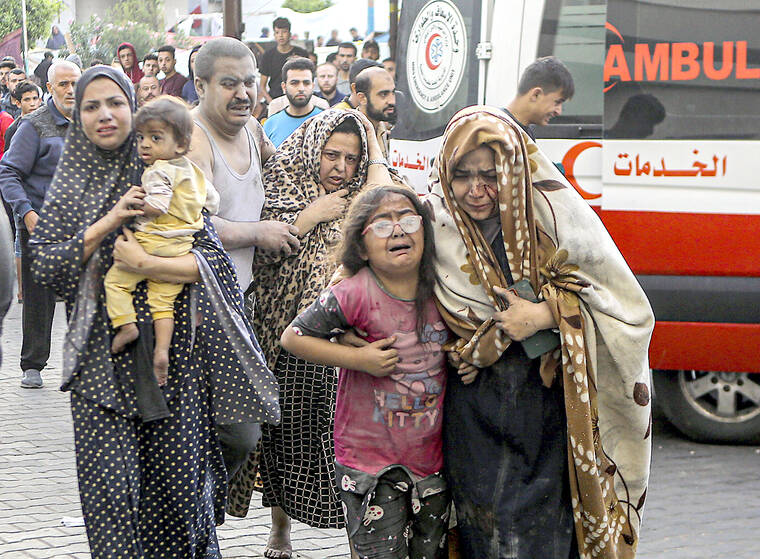RAFAH, Gaza Strip — Truckloads of aid idled at Egypt’s border with Gaza as residents and humanitarian groups pleaded Monday for water, food and fuel for dying generators, saying the tiny Palestinian territory sealed off by Israel after last week’s rampage by Hamas was near total collapse.
U.S. President Joe Biden planned to travel to Israel on Wednesday to signal White House support for the country and to Jordan to meet with Arab leaders. U.S. Secretary of State Antony Blinken announced the trip early Tuesday in Tel Aviv during his second visit to Israel in less than a week amid fears that the fighting could expand into a broader regional conflict.
In Gaza, hospitals were on the verge of losing electricity, threatening the lives of thousands of patients, and hundreds of thousands of Palestinians displaced from their homes searched for bread. Israel maintained punishing airstrikes across Gaza as a ground invasion loomed, while Hamas militants kept up a barrage of rocket attacks, and tensions mounted near the Israel-Lebanon border.
More than a week after Israel cut off entry of any supplies, all eyes were on the Rafah crossing, Gaza’s only connection to Egypt. Mediators were trying to reach a cease-fire that would let in aid and let out trapped foreigners. Israeli airstrikes forced the crossing to shut down last week, but it remained unclear Monday which of the regional actors was keeping the crossing closed.
Blinken, who returned to Israel after a six-country tour through Arab nations, said the U.S. and Israel had agreed to develop a plan to enable humanitarian aid to reach civilians in Gaza. There were few details, but the plan would include “the possibility of creating areas to help keep civilians out of harm’s way.”
“We share Israel’s concern that Hamas may seize or destroy aid entering Gaza or otherwise prevent it from reaching the people who need it,” Blinken said.
Israel evacuated towns near its northern border with Lebanon, where the military has exchanged fire repeatedly with the Iranian-backed Hezbollah group.
Speaking to the Israeli Knesset, Prime Minister Benjamin Netanyahu warned Iran and Hezbollah, “Don’t test us in the north. Don’t make the mistake of the past. Today, the price you will pay will be far heavier,” referring to Israel’s 2006 war with Hezbollah, which operates out of Lebanon.
Soon after he spoke, the Knesset floor was evacuated as rockets headed toward Jerusalem. Sirens in Tel Aviv prompted U.S. and Israeli officials to take shelter in a bunker, officials said.
Iran’s foreign minister, meanwhile, warned that “preemptive action is possible” if Israel moves closer to a ground offensive. Hossein Amirabdollahian’s threat followed a pattern of escalating rhetoric from Iran, which supports Hamas and Hezbollah.
This has become the deadliest of the five Gaza wars for both sides. At least 2,778 people have been killed and 9,700 wounded in Gaza, according to the Health Ministry there. More than 1,400 Israelis have been killed, the vast majority civilians massacred in Hamas’ Oct. 7 assault.
The Israeli military said Monday that at least 199 hostages were taken into Gaza, more than previously estimated. Hamas said it was holding 200 to 250 hostages, including foreigners whom it said it would free when it was feasible.
Also Monday, Hamas’ military wing released a hostage video showing a dazed woman having her arm wrapped with bandages. The woman, who identified herself in the video as Mia Schem, 21, rocked slightly as she spoke, the sound of explosions reverberating in the background. In her statement, Schem said she was taken from Sderot, a small Israeli city near the Gaza border where she had attended a party. Hamas said she had undergone a three-hour operation.
The Israeli military said Schem’s family was told of her abduction last week, and officials dismissed the video as propaganda.
The plight of the hostage s has dominated the Israeli media since the attack, with interviews of their relatives playing almost constantly. Israeli officials have vowed to maintain the siege of Gaza until the hostages are released.
The head of Israel’s Shin Bet security service, in charge of monitoring militant groups, took responsibility for failing to avert Hamas’ surprise attack. As agency head, “the responsibility for that is on me,” Ronen Bar said.
“There will be time for investigation — now is a time for war,” he wrote in a letter to Shin Bet workers and their families.
The combination of airstrikes, dwindling supplies and Israel’s mass evacuation order for the north of the Gaza Strip has thrown the tiny territory’s 2.3 million people into upheaval and increasing desperation. More than 1 million have fled their homes, and 60% are now in the approximately 14-kilometer-long (8 mile) area south of the evacuation zone, according to the U.N.
The Israeli military says it is trying to clear civilians for their safety ahead of a major campaign against Hamas in Gaza’s north, where it says the militants have extensive networks of tunnels and rocket launchers. Much of Hamas’ military infrastructure is in residential areas.
Those fleeing northern Gaza still faced airstrikes in the south. Before dawn Monday, a strike in the town of Rafah collapsed a building sheltering three families who had evacuated from Gaza City.



